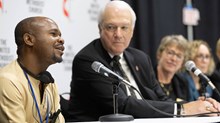On Sunday, Brazilians elected their first woman president in what many commentators labeled a mandate to continue the popular policies of outgoing president Luiz Inácio Lula da Silva.
In her first speech as president-elect, Dilma Rousseff thanked many people but did not thank God—something many voters had expected her to do amid a campaign drenched in outreach to evangelical voters. Dispute over Rousseff's support for same-sex marriage and abortion led both her and defeated candidate Jose Serra to turn to pastor-advisors and Christian outreach committees to gain evangelical sympathy.
But what drew the most attention about evangelical voters came in an earlier round of voting, as nearly 20 million Brazilians cast votes for Marina Silva, a former environment minister and committed Assemblies of God member from a small party with little money. With more than 19 percent of the vote, Silva forced an unexpected runoff between Rousseff and Serra.
The largest private research institute in Brazil, IBOPE, noted that Rousseff lost many votes in the final weeks of the first round because her positions on abortion and homosexuality generated insecurity and dissatisfaction among evangelicals and Catholics, two large groups that are often at odds in the country but rally together on these two themes in political seasons.
However, two leading sociologists of Brazilian Christianity, Paul Freston and Alexandre Brasil Fonseca, argued that there is not as much such cohesion and unity among evangelical voters as some observers presumed. Evangelical voters were also split between Rousseff and Serra. This is especially true of neo-Pentecostals, whose 10 million members often belong to large churches with strong media clout.
The power struggle between two of Brazil’s high-profile pastors was clearly on display. Bishop Edir Macedo, leader of the Universal Church of the Kingdom of God, which claims 13 million members, supported Rousseff. Macedo openly clashed with television personality Silas Malafaia, a Serra supporter who is the former vice president of the 15-million-member Assemblies of God.
Another group of Christian leaders concerned with shaping public opinion during the election produced a document calling for ethics and Christian witness to the gospel. Signers include the former president of the now-defunct Brazilian Evangelical Association, Ariovaldo Ramos, a Baptist and moderate conservative.
In Brazil, the term evangelical generally describes Protestants who believe in the Bible as the Word of God and have accepted Jesus as personal Savior, but do not necessarily hold to other traditional Protestant doctrines and thus offer limited comparison to evangelicals in the United States. But at an estimated size of 40 million among Brazil's 200-million population, they are becoming an increasing political force (if not voting bloc) in the nation. After October's parliamentary election, 68 federal deputies and three senators are evangelicals. While that is only 13 percent of Brazil's National Congress, it is nearly double the 7 percent of evangelical representation before the election.
Marcos Simas is editor of Cristianismo Hoje, Christianity Today's Brazilian edition.
Copyright © 2010 Christianity Today. Click for reprint information.
Related Elsewhere:
Previous Christianity Today coverage of Brazil includes:
Jesus March in Brazil | São Paulo parade highlights more than the gospel. (July 20, 2010)
Higher Goals | Brazilian evangelicals will be ready when nation hosts 2014 World Cup. (July 14, 2010)

Support Our Work
Subscribe to CT for less than $4.25/month


















